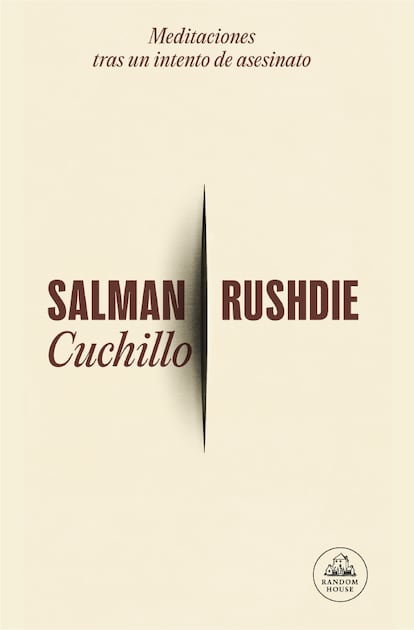Neither puritans nor fanatics have a sense of humor. Salman Rushdie (Bombay, 77 years old) knows this well, as Javier Cercas recalled this morning at the Ateneo de Madrid. At 9:30 in the morning, the seats in the auditorium were full and the audience included everyone from the Minister of the Interior to the US ambassador to Spain; also authors such as Juan Gabriel Vásquez, Alma Guillermoprieto or Mónica Ojeda. On stage Cercas, Rushdie and journalist Montserrat Domínguez, content director of Cadena SER, to talk about Knife, the book that the writer born in India and nationalized as British and American publishes in Spanish. This is the first-person account of the attack that he suffered in August 2022 at the hands of a young radical Islamist, more than 30 years after Ayatollah Khomeini issued a fatwa against the author of satanic verses.
Rushdie was on stage in 2022 to participate in a talk when his would-be assassin attacked him and stabbed him 15 times. He lost an eye and spent almost a year hospitalized, but the author of midnight children He gets on stage again to talk about literature. “We must protect Rushdie at all costs. Protecting Rushdie is protecting the joy, the rose, the will to live. Protecting Rushdie is protecting civilization,” emphasized Cercas, recalling a writing of his about the author. “Knife It is not a minor book, it is an act of revenge and alchemy because it transforms evil into beauty. “Literature is useful whenever it does not intend to,” said the Spanish novelist. “There is a huge misunderstanding about Rushdie because many think that he is a serious and solemn writer and that is why he has been a victim of fanaticism. But he is a comedian like Cervantes, he is extremely funny and that is why fans hate him.” Rushdie added that his book was born from a terrible act of violence, but it has humor, he did not want to be didactic or heavy.
One of the things he took away from the attack was a stronger connection with his body: “If you are a writer you are less connected to your body than, say, an athlete. I have now gone through 1,001 doctors and this emphasis on the physical is a change. In a hospital everyone is very careful that you go to the bathroom regularly, for example, something that is very strange if you are used to having a certain amount of privacy, that is lost. There is something absurd, as if you became The rhinoceros, Ionesco’s work,” he said, showing off his fine humor.
Asked about the attack itself, he spoke of what he felt when he was stabbed, of how he heard an inner voice that told him: “don’t die.” He never lost consciousness until he was sedated at the hospital. “Maybe we all have that survival instinct that we don’t know is there until we need it,” he said. “I discovered that I am tougher than I thought, that I have a resistance that I did not know.”
Since the Iranian Ayatollah identified him as an enemy to annihilate in 1989, Rushdie has experienced different phases. After a few years tightly protected in the United Kingdom, he settled in New York. “There in 25 years I never felt that he had an iota of danger. He had ended the threat of state terrorism,” he recalled. “I don’t want to seem heroic, I am a world expert in security and there are two different concepts: danger and risk. “I started my life again, because it wasn’t so risky.”
Cercas recalled a long dinner with Rushdie in France, and how he wondered about the security measures, until he realized that in the restaurant only his table was occupied, where they extended the after-dinner meal. “Yes, Javier, but I have never drunk gin & tonicsino vodka tonic“Rushdie corrected him. Regarding his relationship with literature in Spanish, he spoke about Cervantes and the authors of the bum that he published a paperback stamp when he was a student — “I was able to read Cortázar, Asturias, Manuel Puig” —. Later, Gabriel García Márquez arrived, highly recommended by a friend. “A hundred years? Of loneliness? “Do you really think I’ll have a good time with this?” he said he told that friend. He found an echo in that novel that he recognized in his childhood experiences in India and Pakistan, although “García Márquez privileges the vision of the people and I come from a big city, my writing is from the metropolis.”
Literature, books, cannot change the world and their influence is very limited. “It’s very unusual for a book to change something in the world, maybe Jane Fonda did it,” Rushdie joked. “The question is how to deal with atrocities. If you look at them head-on in your writing it can be too horrible and if you avoid it it is a trick. You have to find an angle,” reflected the author of Knife. Cercas then spoke of the power of novels to influence a reader, one by one, and defended that literature can change the way we look at the world. “We live in the era of lies, with Putin saying that Ukrainians are Nazis and Trump that the 2020 elections were fraudulent. “Many people end up swallowing these falsehoods,” Rushdie warned.

